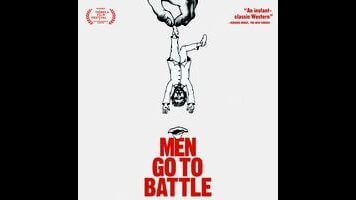The Civil War becomes low-key comedy in Men Go To Battle

Kentucky in the early months of the Civil War. The two Mellon brothers—reddish-haired near-illiterates from a fictional nowheresville with the wry name of Small’s Corner—sneak into a ball held by their social betters, where young men and women with greasy hair and ill-fitting clothes dance stiffly to an out-of-tune piano in candlelight so dim that they have to squint to see, sometimes pausing for awkward conversation and mid-19th-century pickup lines. (“You remind me of a girl I used to know… She died many years ago.”) Henry (Tim Morton), the shorter and less at ease of the two, makes a fumbling pass at a rich girl and gets so embarrassed that he runs off into the night, looking over his shoulder as he half-jogs into the background—a moment familiar from countless film and TV cringe comedies made over the last decade-and-change. It’s just that Henry keeps running, joining the nearby Union Army offscreen.
Made on what appears to be a very modest budget, Zachary Treitz’s debut feature, Men Go To Battle, applies the aesthetic of a do-it-yourself relationship indie (handheld camerawork, lots of close-ups, half-mumbled dialogue) to the tumult of the Civil War—the nation-defining conflict as seen from yesterday’s Brooklyn, in other words. It might seem apolitical at first glance, but Men Go To Battle’s ramshackle vibe has its subversive qualities. Pointedly set in a border state, the movie is as much about demystifying and de-prestige-ing the mythology of the Civil War as it is about the fact that young men have always felt aimless and frustrated, even in times of historic turmoil. The plantation homes are sparse, and even the people with enough land to need slaves don’t seem to know how to act or talk around them. There are comically impersonal letters written by dictation, parodying the articulate correspondence read in Ken Burns documentaries.
Co-written by Treitz and stalwart indie actress Kate Lyn Sheil (who appears in a small role), Men Go To Battle sketches its period as an era of flop sweat, ambitious but poorly maintained mustaches, and ratty jackets. Francis (David Maloney), the taller and louder brother, is always on the lookout for a potential buyer for their acreage, which is too big for the two to maintain on their own. Framed in 1.66—an unusual aspect ratio that only really caught on in France, but was recently used for The Witch—Men Go To Battle is a movie of stubbornly short focus, forestalling any direct reference to the effects of war for so long that one almost assumes that they will be ignored entirely. While Brett Jutkiewicz’s camerawork and minimal lighting turn evocative in the movie’s starker and more conventionally dramatic last third, a big part of the appeal of Men Go To Battle lies in its poky sense of humor, which recalls regional filmmaking gems like The Whole Shootin’ Match in the early going.
Playing mean-spirited pranks on each other, chasing mules, competing to see who can throw an ax the best, the Mellons are hick nobodies, one always scheming and then yelling “Goddamnit!,” the other always blushing and clamming up. Given that it’s set against a backdrop that’s been mythologized for as long as there have been American movies, the fact that Men Go To Battle resists turning its low-key anticlimactic story of brotherly competition (shy brother puts on uniform, loudmouth stays behind) into a national allegory seems like a feat of restraint. Inevitably, it’s also the movie’s biggest limiting factor; in the end, it’s just about these two guys.